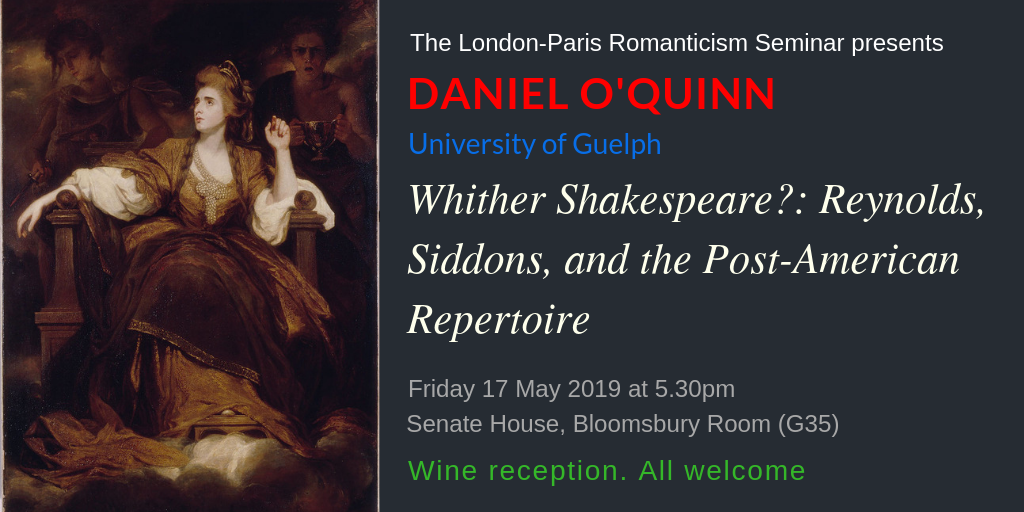
The next meeting of the London-Paris Romanticism Seminar will take place on Friday 17 May in the Bloomsbury Room (G35, ground floor) at Senate House, University of London, starting at 5.30. As our distinguished guest speaker, we are delighted to welcome Professor Daniel O’Quinn of the University of Guelph, who will present a paper entitled Whither Shakespeare?: Reynolds, Siddons, and the Post-American Repertoire. This will be followed by a discussion and wine reception. The event is free and open to everyone, including postgraduates and members of the public. No booking is required.
Daniel O’Quinn is a Professor in the School of English and Theatre Studies at the University of Guelph, Canada.  He is the author of Engaging the Ottoman Empire: Vexed Mediations, 1690-1815 (2018); Entertaining Crisis in the Atlantic Imperium, 1770-1790 (2011); and Staging Governance: Theatrical Imperialism in London, 1770-1800 (2005). He is also the co-editor with Jane Moody of The Cambridge Companion to British Theatre, 1730-1830 (2007). Other publications include a collection of essays entitled Georgian Theatre in an Information Age, co-edited with Gillian Russell, which appeared as a special double issue of Eighteenth-Century Fiction in 2015, and a new collection, Sporting Cultures, 1650-1850, co-edited with Alexis Tadié, published recently by the University of Toronto Press. His current project, The Post-American Repertoire, explores how British culture aesthetically mediated the affective fallout from American decolonization.
He is the author of Engaging the Ottoman Empire: Vexed Mediations, 1690-1815 (2018); Entertaining Crisis in the Atlantic Imperium, 1770-1790 (2011); and Staging Governance: Theatrical Imperialism in London, 1770-1800 (2005). He is also the co-editor with Jane Moody of The Cambridge Companion to British Theatre, 1730-1830 (2007). Other publications include a collection of essays entitled Georgian Theatre in an Information Age, co-edited with Gillian Russell, which appeared as a special double issue of Eighteenth-Century Fiction in 2015, and a new collection, Sporting Cultures, 1650-1850, co-edited with Alexis Tadié, published recently by the University of Toronto Press. His current project, The Post-American Repertoire, explores how British culture aesthetically mediated the affective fallout from American decolonization.
Regarding the subject of his talk, Daniel writes:
“My paper explores the precariousness of the Shakespearean legacy in the immediate aftermath of the American war and the complex re-activation of the repertoire with the advent of Sarah Siddons’s Lady Macbeth in the fall of 1785. Starting with a discussion of the most famous painting of the post-war period, namely Sarah Siddons as the Tragic Muse, and ending with the incorporation of the portrait into a production of Garrick’s The Jubilee, I argue that Reynolds and Sheridan, each in their own way were offering complex cultural commentary on the signification of Shakespeare at this moment. As I make the transit from the exhibition of the portrait to its remediation on stage, I explore the anxieties provoked by Siddons’s epochal performances of the Scottish play. I use the word epochal advisedly because Siddons’s destabilization of Macbeth’s genre and her explicit engagement with Hannah Pritchard’s past performances of the role are a matter of historical import. I am venturing that the struggles to re-align the cultural patrimony were not isolated to specific performances or scripts or texts, but rather permeated the culture at large.”